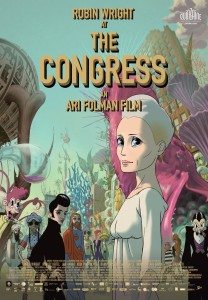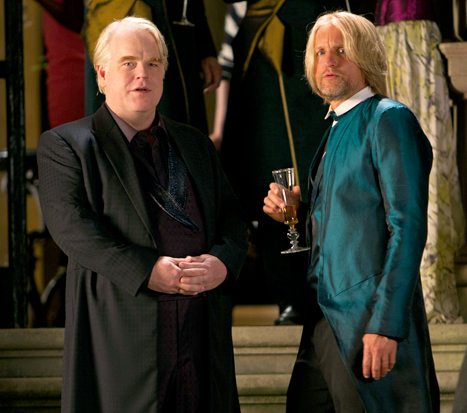Tell me there’s a new independent movie that’s half live-action, half animation, abrim with social commentary, and based on a story by funny/brilliant Polish science fiction author Stanislaw Lem (of Solaris fame), and I am going to see that movie. Tell me it’s strange and obscure and not about to please mainstream audiences and I might start drooling anticipatory drool. Add that it’s written and directed by Ari Folman, who previously made the critically acclaimed animated war movie, Waltz With Bashir and—
—and actually maybe you shouldn’t mention that. I found Waltz With Bashir rather oversold. Not bad, though. Hm.
But so anyway. Lem! Obscure! Commentary! Tripped-out visuals! Sign me up!—Is what I said before sitting through two hours of a boredom so profound I now have a new movie against which to judge all future boring movies.
I would love to find some nice things to say about The Congress, because, sure, there’s a certain kind of writerly glee in trashing a movie, in writing things like, “I’d rather have my eyeballs eaten by gnomes and lit sticks of Acme brand dynamite wedged in my still bleeding sockets than sit through a single minute of The Congress again,” but on the whole, while it’s often trickier to write engagingly about a movie I loved, if it means seeing movies I don’t have to saw my own limbs off to stay awake during, it’s worth it.
I write this review with borrowed arms, having sawed them off to stay awake during The Congress. About which movie, alas, I have nothing nice to say.
I could say the animation looked cool. If it did. I’m not sure what style they wanted—Betty Boop crossed with early Warner Bros. with a Ralph Bakshi twist on top?—but the one they ended up with looks, in a word, bad. Pleasing moments of imaginative trippiness are few.
I could say that, however convoluted or, more exactly, non-existent, the story was, the social commentary gave me thoughts to think. But no thoughts were thunk. At least none beyond, “How much longer is this?”
Speaking of long, the opening 45 minutes or so should have lasted five. In them we meet actress Robin Wright, or at least a movie-fied version of Robin Wright. Her career is dead in the water. She lives in an old airplane hanger outside a tiny desert airport. Harvey Keitel is her agent. He says big-time studio Miramount has a deal for her. They meet with Miramount’s head, Jeff (Danny Huston), who explains that they want Robin to sign away her image for all time. They will digitize her, use her how they please, and she will agree never to act in the real world again. She takes the deal.
And that takes 45 minutes. Maybe a bit more. Also, she has a son with a mysterious malady. He will go blind soon.
This half of the movie feels like listening to a lecture on snail migration patterns. Everyone talks in speeches. Every emotion is beaten so hard it screams. It’s nice to see Keitel with a big part, but he has zero character. He’s just the guy who yells. And then—
20 YEARS LATER—a title card reads. Robin drives a hot car through the desert. At a guardpost she’s told she’s entering the “animation zone,” and drinks a vial of something or other. Bammo! She’s animated.
Animation world is a sort of big hotel full of loopidy-doopidy peoples and creatures. The Congress is meeting there. Why? Who are they? What are they up to? We will never know. Robin meets Jeff again. He wants now to buy her very essence, so people can eat and drink her too. This might be interesting if it were ever mentioned again. It is not.
Then terrorists attack and a guy with a mustache rescues Robin. He’s Dylan (voiced by Jon Hamm). They wander about, and Robin maybe leads some kind of resistance to the whole “digitized actor” thing, which leads to her execution. Or maybe she’s only thrown into a prison camp? It’s a bit of a muddle, this flick. Whatever happens, she’s in trouble, so they put her in a deep freeze.
This is all terribly convoluted and presented in such a way that one never knows what any characters want. What are they trying to do? Are they failing? succeeding? Scenes without meaning pile up. The movie plods along.
Robin awakes in a future where all of the poor people are artfully dirty and the rich live in zeppelins hovering above the city, one of which Robin zip-lines herself up to with nary a security guard to stop her. Inside the zeppelins are pink future-chairs reminiscent of those in 2001: A Space Odyssey, and a very old Paul Giamatti, and finally some opaque business with Robin finding her son.
Whew. Strangely, Robin’s image being bought ends up having nothing to do with the story, aside from window-dressing (“her” latest movie is advertised heavily in animation-land). The focus seems to be that everyone’s on drugs, thus animating them, when in reality they’re poor and dirty. You see—they’re ESCAPING FROM REALITY. Because of how they’re animated? And they look way better when animated? Are you with me here? It’s complicated.
Meanwhile, can you believe Philip Seymour Hoffman? Talk about depressing. Simply one of the best actors ever to have graced the silver screen. We’ll get to see him but a few more times, most strangely in the fourth Hunger Games flick. He died before finishing it, and the producers have decided to complete his unshot scenes with a digital Hoffman. How’s that for unsettling?
Is an actor on-screen ever “real”? Is a digital recreation of that actor less so? What if we can’t tell the difference? There’s a rich vein to mine here, but The Congress forgot its pick-axe. You might say. Put another way, The Congress is neither prescient nor profound. It’s long and directionless and preachy. That it’s clearly out to say something makes it all the more frustrating.
If you’re in the mood for a movie featuring an animated world in which light social commentary is alluded to, you’re better off seeing The Lego Movie. Sure, it’s a 90 minute advetisement for toy blocks, but at least it’s got Will Arnett as Batman.









you have forgotten to mention the two best parts of the film:
1) paul giamatti’s face toupée
2) the exploding plane sex scene
i would also like to give a special shout-out to whomever ran the sound at IndieFest’s opening night event, since I have to shout to hear anything after hearing this film played louder than Krakatoa.
Holy crap, I read three quarters of the way through your review before I realized that this was supposed to be an adaptation of the Futurological Congress. Wait what????
Jason! Please tell us what that story is actually about. I am pretty sure this film was about either the Wright Brothers’ next-gen wunderkind, some sort of bizarre worldwide fascination with Robin Wright, and/or the un-locatability of specific personalities in a world in which personalities either are wholly imaginary or the glitter on a hobo.
It’s the first Lem I ever read and still my fave. It was a while ago though, I would recommend wikipedia over my account: http://en.wikipedia.org/wiki/The_Futurological_Congress
It opens in this international academic conference to deal with overpopulation. Everybody gets drugged with hallucinogens, and it becomes a Philip K Dick-esque account of peeling back layer upon layer of hallucinations to try to decipher the actual state of human existence (and I think ultimately giving up). Except it’s really funny.
The image that stuck with me most from it is the account of this future utopian urban world, where everybody’s rich and happy and eating the best fancy food all the time, but oddly out of breath. The protagonist (professor Tichy) takes this drug that dispels the illusion, and sees that it’s all a government-induced drug hallucination to hide the fact of a dirt poor, massively overpopulated world. Everyone is starving (eating disgusting slop thinking it’s delicacies), dressed in rags, constantly climbing scaffolding to go up and down these skyscrapers that they’re all packed into–the reason why everybody’s always out of breath. But they all happily chug along in their drug-induced reality that only Prof. Tichy can see through.
Should be clear, the Matrix borrowed heavily from this. It’s well worth reading. Much more along the lines of the Cyberiad (fun satirical weirdness) rather than Solaris or His Master’s Voice (oppressive, cry-yourself-to-sleep weirdness).
I’ll have to read that. I’ve read a bunch of Lem, but never got around to this one.
Dooood…. It is so up your alley. Frankly It’s a crime you haven’t adapted it yet. You guys inspired me to go find my copy from my sophomore year SF class in college, so that’s what I’ve been doing the last hour instead of working. Apparently I read it in 1993. Also I am old.
that’s a shame. futurological congress is my favorite lem of all. ultimately, i blame clooney.